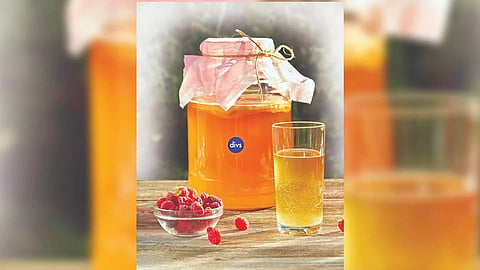

CHENNAI: Kombucha tea needs no introduction for Gen Z and millennials. But, in recent days, the trend has attracted not only youngsters but also elderly people. Even seniors are very keen on adopting new habits and trying stuff to make lifestyle changes for healthy reasons. One such thing that caught their eye is Kombucha Tea. But, even this healthy drink has a few adverse impacts, which people should consider before trying this trendy drink.
Traditional Kombucha is made with the fermentation of black or green tea and sugar with a culture of live-friendly bacteria and yeast. This fermented drink can be prepared at home, which adds to its popularity and growth. But the fermentation process should be done carefully to avoid over-fermentation.
Divya Kumar, brewer and founder of Divs Kombucha, says, “The bacteria and yeast create a wonderful ferment with a quirky sweet-sour-fizzing taste that’s both nutritious and tasty. Divs Kombucha is prepared in controlled temperatures for over three weeks.” Divya also conducts Kombucha tasting events regularly, explaining the history and recent trends associated with the drink.
Kombucha is said to be a natural and healthy alternative for anything alternative or sugary in the market. However, senior consultant paediatrician Dr Nithya Franklyn says that Kombucha is not for everyone. “The bacteria present in the drink are suitable only for those who have a proper immune system. There are no proper guidelines for Kombucha tea consumption. 120 ml per day is recommended, depending upon the health condition,” adds Dr Nithya.
Talking about the different flavours and recent trends related to Kombucha Tea, “A recent trend is using Kombucha as a natural cocktail mixer since it has a unique blend of sweet, sour and fizz. Among the range of flavours we provide, people from the middle-aged group come back to us for the nannari-flavoured Kombucha tea, whereas the younger age group demands hibiscus-flavoured one. We also have unique flavours such as Garden trilogy and Passion fruit kombucha,” says the brewer. Dr Nithya explains to DT Next who can have the drink and also lists the reasons for the same. “Children, pregnant women and aged people will have compromised immunity.
Also, people undergoing specific medication, taking steroids or having health complications should be careful before having this fermented drink. For example, Green tea has its benefits, but we do not recommend it for pregnant women because some ingredients can cause harm. The same applies to Kombucha as well. Though it is a healthy drink with many benefits, it is not for everyone,” advises Dr Nithya.
This probiotic drink is said to be good for digestion, blood pressure, cholesterol, boosting immunity, weight loss, and heart-related problems among others. The good bacteria help in resetting the gut environment. It is also said that the antioxidants present in Kombucha have an anti-ageing effect. An important thing to be noted is that there is no proper study about the benefits of Kombucha. The above-listed benefits are claimed to be true by brewers and people who regularly drink Kombucha.
Divya explains to us the procedure to make Kombucha at home, but also cautions us about over-fermentation. “Take SCOBY, a symbiotic culture of bacteria and yeast (about 100 ml), and stir it with 900 ml Black tea and Sugar (20%). Cover it with a dry kitchen cloth. Leave at room temperature in a dark place. Over the course of a few days, you will notice a thin film growing over the tea. Over time you can taste test and see the kombucha has started vinegarising. When you like the taste of it, you can take it to the next stage of infusing flavours and bottling,” explains Divya. Kombucha should be prepared in a strict environment to avoid over-fermentation.
Kombucha builds immunity on one side, but also has bacteria and yeast, which if not taken within limits, will cause life-threatening issues. “Nowadays, people make lifestyle changes without understanding the science behind it. There are people who try to understand the pros and cons of the drink and take it in moderation. Some follow the Kombucha trend as they feel it is an easy route to a healthy way of living. This fermented tea can increase acidity and cause infections, if not controlled. This might lead to liver problems,” remarks the doctor. She also recommends home brewers use plastic or glass utensils for fermentation as ceramic bowls Kombucha observes heavy metals present in ceramic.
Just like the famous quote ‘Too much of anything is good for nothing’, instead of blindly following a trend, people should research and understand the trend and decide whether it will be suitable for them.